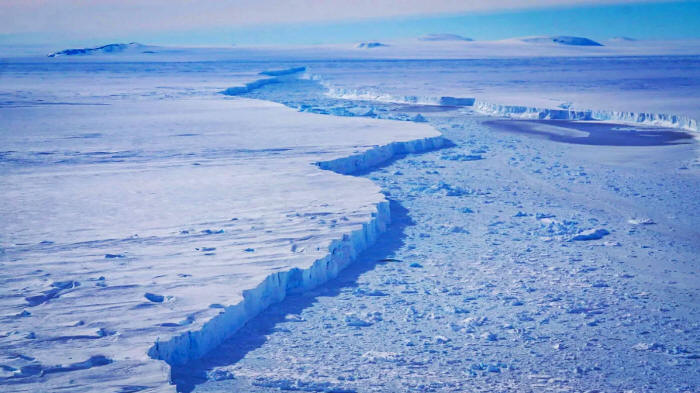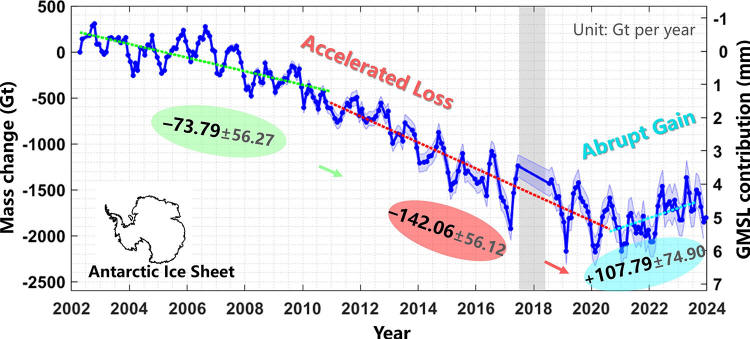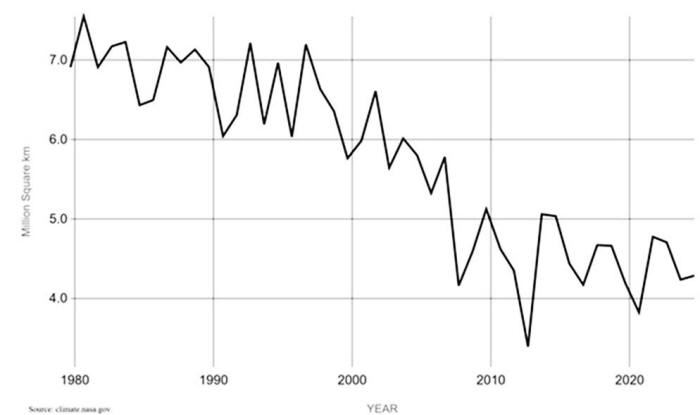|
captured during NASA’s Operation IceBridge flight. Credit: Brooke Medley, NASA
According to the Helmholtz Association, this is of great significance for rising sea levels...
And indeed, the rising sea level caused by the
melting Antarctic ice is one of the central arguments of climate
policy that has worried people.
Chinese researchers from Tongji University led by Dr. Wei Wang and Prof. Yunzhong Shen 1 found that,
The data evaluated by NASA's GRACE satellite showed an annual loss of 74 billion tons per year from 2002 to 2010. From 2011 to 2020, the amount even doubled.
Now the ice has increased by around 108 billion tons year on year.
Antarctic Ice Sheet mass change series (April 2002–December 2023) derived from GRACE/GRACE-FO satellite gravimetry. Ellipses highlight period-specific mass change rates, while the grey shadow indicates the data gap between missions. Credit: Science China Press
As the melting of the Antarctic glaciers contributed around 20% to sea level rise, a slowdown in the rise has been observed since 2021.
Wouldn't this good news be worth reporting on the news? Not so far.
A second piece of good news is also not being reported by the German Tagesschau news or political Berlin:
A recent publication by Mark England from the University of Exeter and Lorenzo Polvani from Columbia University in New York has drawn attention to this.
The researchers report that the decline in Arctic sea ice is expected to pause for decades. They expect it to continue for at least the next 5-10 years.
As recently as 2009, John Kerry, US "climate envoy," sounded the alarm that the Arctic would be ice-free in 2013... (sic)
The reality turned out differently:
Source NASA
The decline in Arctic sea ice up to 2012 is well documented by satellite measurements, as is the subsequent stabilization and slight recovery.
The annual September minimum is used for comparison. Following the strong warming of recent years, a renewed decline was expected. But the sea ice remains stable.
Yet, this clear measurement data does not prevent the German Tagesschau news from reporting on March 28, 2025 that the decline in sea ice is continuing, with "serious consequences" for the climate system.
And we are still paying broadcasting fees for such false information, which obviously serves political purposes.
Climate science in crisis?
Climate model forecasts are increasingly deviating from reality.
Axel Bojanowski spoke to two scientists from the Max Planck Institute for Meteorology in Hamburg. Prof. Bjorn Stevens and Prof. Jochem Marotzke speak of a crisis in climate science.
Marotzke:
Marotzke is concerned about the great uncertainty of the models.
He cites the following examples:
With regard to climate science, Marotzke speaks of "the other climate crisis".
My impression is that some clever scientists are now realizing that by pointing to the unshakable statements of the climate models,
We will remember the statements of the UN:
Climate models "no longer reflect reality"
These statements are based on climate models for which, according to Marotzke, we now need a paradigm shift because they no longer reflect reality with sufficient accuracy after just a few years.
References
|




